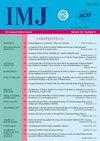痛经的病因及治疗特点
Q4 Medicine
引用次数: 0
摘要
痛经是一种周期性病理,其特征是在月经来潮前夕或最初几天出现疼痛。这种状况影响妇女的日常生活质量,导致她们不能学习和工作,并限制她们参加体育比赛或社会活动。此外,许多女性会经历与痛经相关的持续情绪压力。然而,如果治疗方法选择正确,一般预后良好。并发症主要取决于疼痛的强度,疼痛会影响女性的生活质量和日常活动。如果原发性痛经与任何病理或疾病无关,也没有任何严重并发症,那么继发性痛经,根据病因,并发症可能表明不孕、盆腔脱垂、严重出血和贫血。非甾体抗炎药已被证明是治疗痛经的一线药物。在严重的情况下,需要更高剂量的这些药物或联合/辅助治疗。如果使用激素类药物不能充分改善患者的病情,则以周期性方式开具激素类药物处方,即孕激素或联合口服避孕药。所有口服激素避孕药都被认为能有效减轻女孩痛经的疼痛,但对于成年女性,尤其是继发性闭经的女性,激素避孕药的有效性数据较差且相互矛盾。均衡、健康的饮食可以改善痛经过程,因此女性意识到痛经的必要性很重要。维生素和膳食草药补充剂在治疗痛经方面也相当有效。对现代激素避孕方法的进一步研究,以及长期安全使用激素避孕方法治疗不同年龄女性痛经的可能性是有希望的。关键词:痛经,非甾体抗炎药,口服激素避孕药。本文章由计算机程序翻译,如有差异,请以英文原文为准。
DYSMENORRHEA: FEATURES OF ETIOPATHOGENESIS AND TREATMENT
Dysmenorrhea is a cyclic pathology, characterized with the appearance of pain on the menstruation eve or in its first days. This condition affects the quality of life of women on a daily basis, causes absences at study and work, and restricts participation in sports competitions or social events. In addition, many women experience constant emotional stress associated with dysmenorrhea. However, if the treatment is chosen correctly, general prognosis is good. Complications depend primarily on the intensity of pain, which affects a woman's quality of life and daily activities. If the primary dysmenorrhea is not associated with any pathology or disease and does not have any serious complications, then the secondary one, depending on the etiology, the complications may indicate infertility, pelvic prolapse, severe bleeding and anemia. Nonsteroidal anti−inflammatory drugs have been shown to be the first line of treatment for dysmenorrhea. In severe cases, higher doses of these drugs or combination / adjuvant therapy are prescribed. If their use does not provide sufficient improvement of the patient's condition, hormonal drugs are prescribed in a cyclic mode, i.e. progestogens or combined oral contraceptives. All oral hormonal contraceptives are considered effective in reducing the pain of dysmenorrhea in girls, but in adult women, especially in secondary amenorrhea, data on the effectiveness of hormonal contraception are poor and contradictory. A balanced, healthy diet improves the dysmenorrhea course, so it is important that women are aware of its need. Vitamins and dietary herbal supplements have also been quite effective in dysmenorrhea treatment. Further investigations of modern methods of hormonal contraception, the possibility of their long−term and safe use in dysmenorrhea in women of different ages is promising.
Key words: dysmenorrhea, nonsteroidal anti−inflammatory drugs, oral hormonal contraceptives.
求助全文
通过发布文献求助,成功后即可免费获取论文全文。
去求助
来源期刊

International Medical Journal
医学-医学:内科
自引率
0.00%
发文量
21
审稿时长
4-8 weeks
期刊介绍:
The International Medical Journal is intended to provide a multidisciplinary forum for the exchange of ideas and information among professionals concerned with medicine and related disciplines in the world. It is recognized that many other disciplines have an important contribution to make in furthering knowledge of the physical life and mental life and the Editors welcome relevant contributions from them.
The Editors and Publishers wish to encourage a dialogue among the experts from different countries whose diverse cultures afford interesting and challenging alternatives to existing theories and practices. Priority will therefore be given to articles which are oriented to an international perspective. The journal will publish reviews of high quality on contemporary issues, significant clinical studies, and conceptual contributions, as well as serve in the rapid dissemination of important and relevant research findings.
The International Medical Journal (IMJ) was first established in 1994.
 求助内容:
求助内容: 应助结果提醒方式:
应助结果提醒方式:


